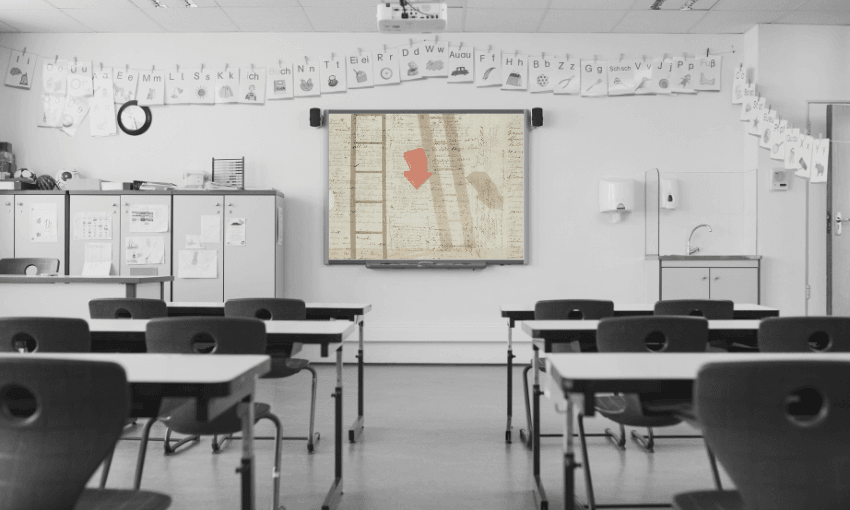A tense day in the house reached a fiery collusion when Brooke van Velden became the first MP to use the word ‘cunt’ in parliament.
You could cut the tension in the air with a knife. There was a trepidation that it was coming. That word, the one that’s been on the minds and lips of every political observer this week. The one that starts with c and rhymes with runt.
It began with a column in the Sunday Star Times by Andrea Vance, which criticised the government’s changes to pay equity legislation. Specifically, it focused on the female cabinet ministers, whom Vance charged were “all united in a historic act of economic backhanding other women”. The column was full of intentionally gendered language, most notably that four-lettered word, “c…” [as it appeared in print].
A column this forceful, by a journalist as experienced as Vance, in a national weekly, does not go unnoticed. There wasn’t a single MP who wouldn’t have read it and debated, very carefully and privately, among people they trusted, whether it was appropriate.
When parliament convened on Tuesday, there was plenty of debate about the pay equity reforms, but everyone avoided mentioning The Column. Before Wednesday’s question time even began, it was clear that wilful blindness wouldn’t last.
The order paper, published before the 2pm session, listed the day’s questions to ministers. The eighth question on the list was from Labour’s Jan Tinetti to Brooke van Velden, the minister for workplace relations and safety: “Does she agree with Andrea Vance, who said about the Equal Pay Amendment Bill, ‘It is a curious feminist moment, isn’t it? Six girlbosses – Willis, her hype-squad Judith Collins, Erica Stanford, Louise Upston, Nicola Grigg, and Brooke van Velden – all united in a historic act of economic backhanding other women’; if not, how is unilaterally stopping 33 pay equity claims not a historic act of economic backhanding other women?”
MPs whispered among themselves, waiting in nervous anticipation. Would Tinetti really go there? Would speaker Gerry Brownlee allow it? How would van Velden respond?
The first 40 minutes of question time involved all the usual nonsense. Boring patsy questions from backbench MPs (“What recent reports has she seen on the government’s fiscal position?”). Nicola Willis said the Greens were from “Planet La La Land”. Minister for Māori development Tama Potaka was away, so Judith Collins answered questions on his behalf – someone chirped “talofa”, which left Rawiri Waititi struggling to breathe. Winston Peters held up a copy of the Green Party’s alternative budget, which it had announced that morning, with a soviet flag inserted between the pages. “Join the party, I’ll send you a membership form,” Francisco Hernandez yelled.
Brownlee admonished Peters after another communism-related quip, “In the world of three strikes and you’re out, you’ve used up your three strikes.” Peters smiled warmly back at him, and Brownlee made no effort to remove the strike-less deputy prime minister from the house.
Then the moment came. Tinetti asked her question, exactly as it appeared on the paper. The brains trust of Luxon, Bishop and Peters leaned forward in anticipation. Willis shook her head and let out a big puff. She looked genuinely upset.
Brooke van Velden had had plenty of advanced warning and was eager to respond. She leapt to her feet, “Mr Speaker…” Brownlee cut her off immediately for a point of order by Shane Jones, who complained that the quote brought members of the house into disrepute. “How on Earth this question got through your process, that is something that you can address,” Jones said. Brownlee replied sardonically, “Well, thank you firstly for giving me the opportunity to review my own performance. I will undertake that with some vigour.”
Brownlee stood by Tinetti’s question. He said it was appropriate for ministers to be asked whether they agree with the opinions of others and that “the bar for discreditable references is a very high one”. This led to a long back-and-forth with Jones, Bishop and Peters arguing about specific speakers’ rulings and standing orders. Peters referenced a rule against “offensive or unparliamentary expression”, to which Swarbrick heckled, “Do you want a mirror?”
Brownlee stuck to his guns and insisted van Velden could answer the question. “It was hard to find a single sentence in Andrea Vance’s article I agree with,” van Velden began. Again, Brownlee cut her off, “That’d be enough of an answer.” It was a highly unusual move to end a minister’s answer after just one sentence. Brownlee was trying to stop her from saying The Word.
Van Velden complained that she’d only given half of her answer, but Brownlee ordered her to sit back down. David Seymour and Kieran McAnulty formed an unlikely defence duo, arguing that she should be allowed to answer the question. Tinetti tried to push on with her next supplementary question, which set off more back-and-forth and general yelling.
Van Velden stood up again, cutting through the hubbub: “Point of order. I’m a strong woman and I can speak for myself.” Finally, after another supplementary question from Tinetti, van Velden got to say the word she had been itching to say: “I do not agree with the clearly gendered and patronising language that Andrea Vance used to reduce senior cabinet ministers to ‘girlbosses”, ‘hype-squads’, references to ‘girl math’, and ‘cunts’.” Then she turned her fire back to Tinetti, criticising the former minister for women for repeating parts of “a clearly misogynistic article” in the house.
It was, according to Hansard, the first time anyone had said the word “cunt” in parliament. Brownlee, for all his efforts to prevent her from saying it, gave the softest possible rap on the knuckles: “While the minister was giving an answer that was quoting commentary from a news article, it may have been better to refrain from one word that was fully expressed.”
Speaking to media on the tiles afterwards, van Velden said it was “inappropriate for the Labour Party to have brought misogyny into the house”. Chris Bishop returned to the house later in the afternoon to take another crack at Labour for not condemning Vance’s words. “The C-word has been thrown around a bit in the last week. I want to read out some C-words that I think apply to the Labour opposition: callous, cruel and cowardly.”
The whole ordeal was a bizarre blunder from Tinetti and Labour. The political equivalent of stepping on a rake, except you put the rake there and aimed very carefully to put your foot in exactly the right place so it would lever the handle right up into your face. The government’s changes to pay equity are a potentially winning issue for the opposition, but now they’re on the back foot.
Vance’s column has already grabbed the attention of everyone who would care enough to have a take. There was no amplification benefit in mentioning it in the house. And especially no benefit for Labour to tie itself to those words. All it’s done is allow the government to flip the narrative and claim the outraged moral high ground.




